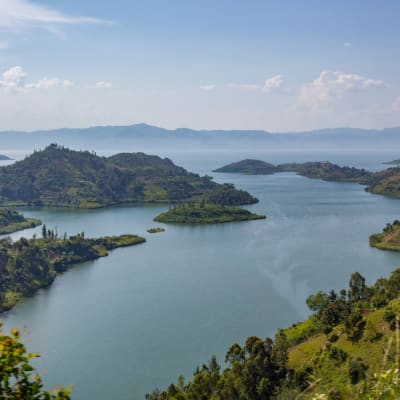
Health preparation for your adventure
A trip to Rwanda promises unforgettable experiences – from encountering fascinating wildlife in national parks to exploring picturesque landscapes and enjoying warm, heartfelt interactions with the locals. However, to fully embrace the adventure, travelers should prioritize their health well in advance.
In this article, you’ll find everything you need to know about essential and recommended vaccinations, important preventive measures, and tips for optimal preparation. With the right medical planning and precautions, nothing will stand in the way of a safe and worry-free journey to the heart of Africa.
General Vaccination Recommendations for Rwanda
Travelers heading to Rwanda should carefully plan their vaccinations well in advance to ensure they are fully protected. While some vaccines are mandatory, others are strongly recommended based on individual travel plans and circumstances.
Yellow Fever Vaccination
A yellow fever vaccination is mandatory for anyone entering Rwanda from countries where the disease is endemic. It is required for all travelers aged one year and older. Since yellow fever is endemic in Rwanda and spread by mosquitoes, this vaccination is a vital protective measure. Even if you are traveling directly from Europe, it is advisable to consult a healthcare professional to ensure compliance with current regulations. A single shot provides lifetime protection against this potentially life-threatening disease.
Hepatitis A and B
Hepatitis A poses a significant risk, as it is transmitted through contaminated food and water. A vaccination is highly recommended for all travelers to Rwanda, offering reliable protection against this highly contagious liver infection.
Hepatitis B, on the other hand, is spread through blood and bodily fluids. This vaccine is particularly important for long-term travelers, those venturing into remote areas, or individuals who may require medical care during their trip. Travelers planning close contact with local communities should not skip this vaccine. A combined Hepatitis A and B vaccine offers a convenient way to achieve comprehensive protection.
With these vaccinations, travelers establish a solid foundation for their health and safety while visiting Rwanda. It’s best to consult a travel health specialist 4–8 weeks before departure to address individual vaccination needs and precautions.
Protecting Yourself Against Infectious Diseases
Travelers to Rwanda should be well-informed about potential infectious diseases and take targeted preventive measures. This includes vaccinations, malaria prevention, and mosquito bite protection to minimize health risks during the trip.
Malaria Prevention
There is a high malaria risk throughout Rwanda below 8,200 feet (2,500 meters), including urban areas. Transmitted via mosquito bites, malaria – especially the Plasmodium falciparum strain – can be severe. Preventive antimalarial medication is highly recommended. Common options include Atovaquone/Proguanil (Malarone®), Doxycycline, or Mefloquine, depending on individual tolerance and medical advice.
In addition to medication, effective mosquito protection is essential.
Other Infectious Diseases
Travelers should also be aware of additional health risks:
- Gastrointestinal Infections: Often caused by contaminated food or water, diseases like typhoid, Hepatitis A, and, less commonly, Hepatitis E are concerns.
- Schistosomiasis (Bilharzia): This parasitic infection can be contracted through contact with freshwater, such as swimming in Lake Kivu. Avoid bathing in rivers or lakes to reduce risk.
- Rabies: There is a risk of rabies, particularly from animal bites. Vaccination is recommended, especially for those visiting rural areas or engaging in activities like trekking.
- Marburg Virus: As of September 2024, an outbreak has been reported. Travelers should strictly avoid contact with infected individuals, blood, or bodily fluids.
Mosquito Protection Strategies
Preventing mosquito bites is crucial to avoiding malaria and other mosquito-borne diseases like dengue or chikungunya. Follow these strategies for effective protection:
- Wear long, light-colored clothing to cover exposed skin.
- Apply insect repellents containing DEET or Icaridin to uncovered skin.
- Sleep under insecticide-treated mosquito nets, especially in accommodations without air conditioning.
- Treat clothing with insect repellent for added protection.
By following these precautions and seeking pre-travel medical advice 4–6 weeks before departure, travelers can significantly reduce their risk of infection and enjoy a safe, worry-free journey to Rwanda.
Travel First Aid Kit and Hygiene Tips
A well-prepared travel first aid kit and strict hygiene practices are key to ensuring a safe and worry-free trip to Rwanda. Here’s what you need to know about essential medications, tools, and hygiene tips to keep you healthy on the go.
Key Items for Your Travel First Aid Kit
For a trip to Rwanda, a comprehensive travel first aid kit is essential, including medications for common travel ailments and useful medical tools:
- Medications: Bring remedies for diarrhea (Loperamide and electrolyte powder), pain and fever relievers, anti-nausea medications, and antihistamines for allergic reactions. Insect repellents, high-SPF sunscreen, and wound disinfectants are also must-haves. Consult with a doctor to determine if a broad-spectrum antibiotic is advisable.
- Medical Supplies: Stock up on bandages, sterile gauze, elastic wraps, disposable gloves, tweezers, and small scissors. A thermometer and hand sanitizer round out your kit.
- Personal Medications: If you take regular medications, ensure you pack an ample supply, ideally with a doctor’s note for customs checks. Store medications in a cool place and split them between your carry-on and checked baggage for safety.
Consulting a healthcare provider or pharmacist 4–6 weeks before your trip will help you customize your first aid kit to suit your needs.
Essential Hygiene Practices
To minimize health risks during your stay in Rwanda, follow these strict hygiene guidelines:
- Safe Food and Water Practices: Drink only boiled or bottled water (with an intact seal), including when brushing your teeth. Avoid ice cubes, raw or undercooked food, and unwashed produce. Pro tip: Peel fruits and vegetables or wash them thoroughly before eating.
- Personal Hygiene: Wash your hands regularly with soap, especially before meals or after using the restroom. When water isn’t available, use alcohol-based hand sanitizer. Disposable hand towels can also be useful in uncertain conditions.
- Mosquito Protection: Wear long, light-colored clothing, apply insect repellents containing DEET or Icaridin, and sleep under insecticide-treated mosquito nets in malaria-prone areas.
- General Precautions: Avoid freshwater sources such as rivers and lakes to minimize the risk of schistosomiasis (bilharzia). Protect yourself from the sun with sunscreen, sunglasses, and a hat.
With a well-equipped first aid kit and diligent hygiene habits, you can avoid many health risks and enjoy a worry-free adventure in Rwanda.
Health Preparations and Documentation
Careful preparation is crucial for a safe journey. Alongside vaccinations and health precautions, ensure your medical documents are organized and readily available.
Vaccination Records and Health Certificates
Travelers entering Rwanda from yellow fever-endemic regions must present a valid yellow fever vaccination certificate. This vaccination is mandatory for all individuals over 12 months of age and provides lifelong protection.
Additionally, check your immunity for standard diseases such as polio, tetanus, diphtheria, measles, and pertussis and update vaccinations as necessary. Depending on your trip duration and activities, vaccinations against Hepatitis A and B, meningococcal disease (ACWY), typhoid, and rabies may also be recommended. Due to recent disease outbreaks like the Marburg virus, an up-to-date health certificate can be useful when crossing borders.
Medical Consultation and Malaria Prevention
Schedule a travel health consultation at least six weeks before departure to update vaccinations and discuss malaria prevention. Commonly prescribed medications include Atovaquone/Proguanil (Malarone®) or Doxycycline, alongside consistent use of mosquito repellents, nets, and protective clothing.
Important Travel Insurance
Medical care in Rwanda may not meet Western standards, so comprehensive travel health insurance with medical evacuation coverage is essential. A trip cancellation policy can also provide additional security in case of unforeseen events.
Current Health Risks and Updates
Before traveling to Rwanda, stay informed about current health risks to ensure you are well-prepared. Recent updates from the World Health Organization (WHO) and health authorities highlight key concerns:
Marburg Virus Outbreak
In September 2024, Rwanda reported its first Marburg virus outbreak, centered in the capital, Kigali. By the end of October, 66 confirmed cases and 15 deaths were reported, primarily among healthcare workers. Thanks to swift containment measures, no new cases have been recorded since October 30th, but travelers should remain cautious and stay informed.
Mpox Infections
The Mpox virus (formerly known as monkeypox) has spread across Africa since early 2024. Rwanda has reported isolated cases, with 37 confirmed infections as of November. Travelers should monitor for symptoms and seek immediate medical attention if needed.
Other Health Risks
- Malaria remains a major concern, particularly in areas below 8,200 feet (2,500 meters). Preventive medications and mosquito protection are critical.
- HIV/AIDS and other sexually transmitted infections, like Hepatitis B and C, pose ongoing risks.
Reliable Health Information Sources
Stay updated on health advisories and outbreaks through reliable sources before and during your trip:
- US State Department and WHO for travel health alerts.
- Platforms like Travel Health Pro and CDC Travel Health for vaccination details and disease updates.
- Mobile apps like CDC’s TravWell for real-time health warnings and travel preparation checklists.
- Local embassies and consulates for up-to-date, location-specific advice.
By consulting trusted resources regularly, you can stay informed and take the necessary precautions to ensure a healthy and safe journey to Rwanda.
Experience the magic of Africa with experts who have explored every corner themselves
Your dream holiday, tailor-made by experts.
Our travel consultants not only admire Africa from afar, but also explore the most impressive regions every year to experience the cultures, landscapes and experiences, such as gorilla trekking, at first hand.
From your first enquiry to your return home, we are there for you personally - by phone, email or WhatsApp, whenever you need us. Immerse yourself in the world of gorillas, experience the beauty of Africa and create memories that will last a lifetime. Let's create your next great adventure together!
Experts for your Africa trip













